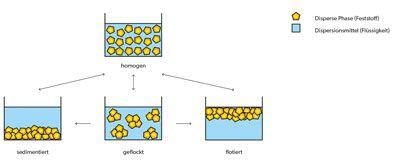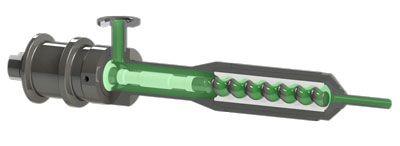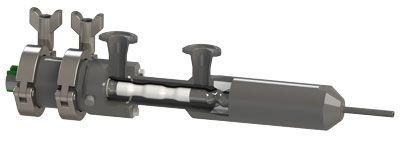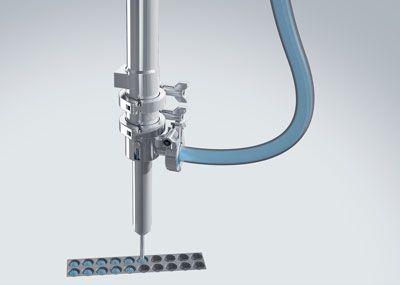
Manufacturers of pharmaceutical products have to fill suspensions independent of viscosity, gentle on the product, homogeneously and with a high degree of accuracy. Viscotec specializes in moving, processing and dosing such viscous, structure-sensitive and solids-laden liquids and offers precise pump solutions for this.
Suspensions are dispersions of solid particles in a liquid. The solids correspond to the disperse phase and the liquids to the dispersant. The preparation of suspensions allows the conversion of poorly soluble drugs in a liquid dosage form. Therefore, suspensions are used in different pharmaceutical applications - both internally and on the skin. Examples of use are suspensions of acid-binding inorganic active ingredients and antibiotic juices. Since undissolved substances are not perceived in terms of taste, it is thus also possible to administer unpleasant-tasting active substances orally. This plays an important role, especially in paediatrics.
Stabilizers prevent sedimentation
 The particles of a pharmaceutical suspension in many cases have a diameter of 100 μm and more. Thus, these are usually coarsely dispersed systems. Depending on the application, the solids content of a suspension is between 0,5 and 50%. This may result in instability due to interfacial energy stored in the system and the density difference between the disperse phase and the dispersant. However, pharmaceutical applications with suspensions require a homogeneous product, since a uniform solids content must be present.
The particles of a pharmaceutical suspension in many cases have a diameter of 100 μm and more. Thus, these are usually coarsely dispersed systems. Depending on the application, the solids content of a suspension is between 0,5 and 50%. This may result in instability due to interfacial energy stored in the system and the density difference between the disperse phase and the dispersant. However, pharmaceutical applications with suspensions require a homogeneous product, since a uniform solids content must be present.
The disadvantage associated with suspensions is the tendency for sedimentation on prolonged storage. In practice, however, it is difficult to realize to limit or avoid such properties. In order to avoid or at least slow down the instability problem and sedimentation, flotation or flocculation, stabilizers can be used. These increase the viscosity of the preparation.
Mucosal substances increase viscosity
 For this purpose, there are various mucilages in the pharmaceutical industry, which are used to increase the viscosity. These include tragacanth, pectin, methylcellulose, hydroxyethylcellulose, carmellose sodium, hydroxyalkylated starch derivatives, sodium alginate, polymers of acrylic acid and dextrans. The type and dose of the stabilizer are determined empirically for each individual case. In general, sedimentation is allowed for pharmaceutical suspensions. However, a prerequisite for a dosage is easy Aufschüttelbarkeit to completely redisperse the sediment. The pharmaceutical manufacturers are thus faced with the challenge of filling suspensions independent of viscosity, gentle on the product, homogeneous and with a high degree of accuracy. In addition, it should be possible to dose even abrasive fillers.
For this purpose, there are various mucilages in the pharmaceutical industry, which are used to increase the viscosity. These include tragacanth, pectin, methylcellulose, hydroxyethylcellulose, carmellose sodium, hydroxyalkylated starch derivatives, sodium alginate, polymers of acrylic acid and dextrans. The type and dose of the stabilizer are determined empirically for each individual case. In general, sedimentation is allowed for pharmaceutical suspensions. However, a prerequisite for a dosage is easy Aufschüttelbarkeit to completely redisperse the sediment. The pharmaceutical manufacturers are thus faced with the challenge of filling suspensions independent of viscosity, gentle on the product, homogeneous and with a high degree of accuracy. In addition, it should be possible to dose even abrasive fillers.
Viscotec specializes in moving, processing and dosing viscous, structure-sensitive and solid-laden liquids and offers precise solutions for this. Due to the abrasive or shear-sensitive properties of the fillers, pump types such as peristaltic or rotary lobe pumps are only conditionally suitable for metering suspensions. The manufacturer's dosing devices have proven themselves in this area. As an eccentric screw pump, they are among the rotating displacement pumps. The stainless steel rotor moves eccentrically in an elastomer stator. The interaction of rotor and stator creates chambers. The size of the alternately opening chambers is also constant during rotation, so that there is no compression of the conveyed product. Due to this metering geometry, a constant volume is always conveyed proportionally to the angle of rotation per revolution - regardless of the viscosity of the medium and with a pulsation-free product flow.
This fact guarantees a dosing accuracy at the pump outlet of 99% (depending on the medium), which is often exceeded in practice. Due to the compression-free conveying also highly viscous and shear-sensitive media can be promoted or filled. The pump technology of the endless piston principle has additional advantages over other metering mechanisms. For example, in over 95% of all applications, filling and dosing valves can be completely dispensed with. A retraction (reversal of the direction of rotation of the dispenser) leads to a controlled thread break and dripping is prevented. This advantage allows, among other things, the exact dosage of thread-pulling gels or resins.
Bypass keeps material moving
 Another advantage over hose and piston pumps is the possibility to integrate a bypass in the pump. In this bypass, the material can be kept in motion during the dosing process and when the system is at a standstill. In critical applications, this prevents sedimentation in the pump feed. The volume flow shown in the figure also offers the option of venting the pump.
Another advantage over hose and piston pumps is the possibility to integrate a bypass in the pump. In this bypass, the material can be kept in motion during the dosing process and when the system is at a standstill. In critical applications, this prevents sedimentation in the pump feed. The volume flow shown in the figure also offers the option of venting the pump.
A typical application of suspensions is the dosing of pharmaceutical products in blister forms. The manufacturer's products are already being successfully used for this purpose in various production plants. In a specific application, the sedimentation could be reduced by using this dosing technique and the longevity of the dosing pump could be improved. The dosing pumps used here comply with the requirements of the GMP and FDA guidelines. Thus, the cleaning and documentation is given due attention. The dispenser can be disassembled without tools after use in less than a minute and cleaned in cleaning baths or in automated rinsers and sterilized in an autoclave.
Picture above: instability of a suspension